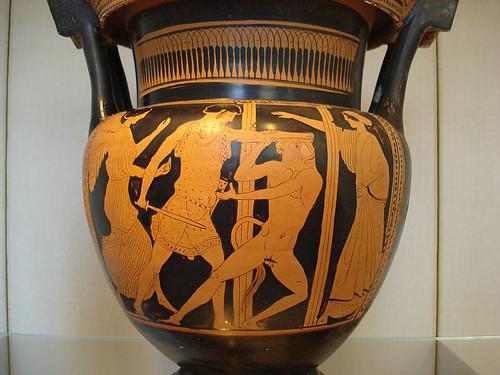Origins and Early Life
Theseus, a central figure in Greek mythology, was born with a destiny as tangled as a Gordian knot. His mother, Aethra, had a fateful encounter with both Poseidon, the god of the sea, and Aegeus, a mortal king, leaving the question of Theseus's true paternity shrouded in mystery.
Before returning to Athens, Aegeus placed his sword and sandals under a hefty rock, setting a test for the young Theseus. If the boy could lift the rock when he came of age, it would prove his rightful claim to the throne. As Theseus grew into a strong young man, he faced the challenge head-on.
With a display of strength that would impress even the gods, Theseus lifted the rock and claimed his birthright. But more than just retrieving the relics, he was embracing his dual legacy—the strength of Poseidon and the wisdom of Aegeus. This moment set the stage for a life destined to be anything but ordinary.

Heroic Deeds and Challenges
On his journey to Athens, Theseus transformed the Greek countryside into his personal proving ground. He encountered numerous bandits and villains, each presenting a unique challenge to the young hero.
First, he faced Periphetes, known as "Clubber," who wielded a massive iron club. With agility and cunning, Theseus dodged the deadly swings and turned the tables on his opponent, claiming the club as his own.
Next, Theseus encountered Procrustes, a notorious host who forced his guests to fit his infamous bed by stretching or chopping them down to size. In a bout of poetic justice, Theseus gave Procrustes a taste of his own medicine, ensuring that the villain would never again torture unsuspecting travelers.
These challenges were more than mere tests of strength; they were opportunities for Theseus to develop his skills, build resilience, and uphold justice. Each victory etched his growing reputation into the annals of Greek mythology, setting the stage for his triumphant arrival in Athens.
The Labyrinth and the Minotaur
Theseus's greatest challenge awaited him in Crete, where he volunteered to be one of the youths sent as tribute to King Minos's labyrinth. This intricate maze housed the fearsome Minotaur, a half-man, half-bull creature with an insatiable appetite for human flesh.
Ariadne, King Minos's daughter, fell in love with Theseus and decided to help him navigate the labyrinth. She provided him with a ball of thread, which he used to retrace his steps and find his way out after defeating the Minotaur.
As Theseus ventured into the labyrinth, he knew that his wits and strength would be put to the ultimate test. The winding passages and shadowy corners seemed to whisper of impending doom, but Theseus pressed on, determined to end the Minotaur's reign of terror.
In a climactic battle, Theseus confronted the beast, using his cunning and skill to outmaneuver the Minotaur's brute strength. With a final, decisive blow, he emerged victorious, not only slaying the monster but also symbolically conquering the darkness within the labyrinth.
Theseus's triumph over the Minotaur represented more than just a physical victory; it was a testament to the power of courage, intellect, and the indomitable human spirit in the face of seemingly insurmountable odds.
Return to Athens and Later Life
Upon his return to Athens, Theseus found himself embroiled in a web of palace intrigue. His father, King Aegeus, had fallen under the influence of the sorceress Medea, who plotted to eliminate Theseus and secure the throne for her own son.
In a twist of fate, Aegeus recognized Theseus's sword just as the young hero was about to drink poisoned wine, preventing a tragic end to their long-awaited reunion. With Medea's scheme thwarted, Theseus took his rightful place as the heir to the Athenian throne.
As ruler of Athens, Theseus implemented sweeping reforms, introducing democracy and consolidating power. His bold leadership style and progressive policies initially won him the admiration of the people, but over time, his popularity began to wane.
In a misguided attempt to bolster his image, Theseus made a fateful decision to abduct Helen, a young girl who would later become the face that launched a thousand ships. This act, combined with growing discontent among the Athenians, led to Theseus's exile from the city he once ruled.
Tragically, Theseus met his end far from the city he loved, cast from the cliffs of Skyros. His story, however, lived on, forever woven into the rich tapestry of Greek mythology—a testament to the enduring power of a hero's journey, with all its triumphs and tribulations.

Theseus's tale is a powerful reminder that even the greatest heroes are not immune to the whims of fate and the consequences of their choices. His journey, filled with bravery, wit, and resilience, continues to captivate and inspire, inviting us to reflect on our own paths through the labyrinth of life.
- Plutarch. Life of Theseus. Translated by Bernadotte Perrin. Cambridge, MA: Harvard University Press; 1914.
- Apollodorus. The Library. Translated by James George Frazer. Cambridge, MA: Harvard University Press; 1921.
- Ovid. Metamorphoses. Translated by A.D. Melville. Oxford: Oxford University Press; 1986.

Leave a Reply